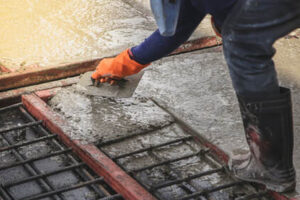Concrete Contractors Dallas TX build, pour, and finish concrete structures like foundations, retaining walls, private driveways, and sidewalks. They also work on concrete repair and maintenance.

Whether it’s an office building or your own home, having a great contractor is critical for getting the job done right. Great contractors use a resource management tool to manage everything from employee scheduling to equipment management.
Concrete is an important part of commercial construction projects and is used in a wide range of applications. However, before any concrete can be poured, the construction site must be properly prepared. Site preparation involves a number of different activities that help to ensure that the building is constructed on a solid foundation and that the construction process runs smoothly and efficiently.
Site preparation begins with clearing the construction site of any trees, debris, and other obstacles. This is usually done using heavy equipment such as bulldozers and excavators. It may also include excavation of higher-grade areas, surface preparation, and fill placement. It is important to prepare the site properly because it can have a significant impact on the stability of the finished concrete structure.
Proper site preparation also helps reduce the risk of damage during the construction process. For example, the site preparation process can identify underground pipes and wires before they are damaged during construction activities. This can save a lot of time and money by preventing the need for costly repairs. In addition, proper site preparation can help increase the lifespan of the completed concrete structure.
Other elements of site preparation include constructing access roads for people and equipment to use during the construction process. This can help keep the construction process running smoothly and efficiently, and it can also help reduce the environmental impact of the project. Site preparation also includes implementing erosion and storm water runoff management techniques to prevent dirt, water, and other debris from damaging surrounding properties.
The amount of site preparation required for a specific construction project will vary depending on a variety of factors, including the size and location of the construction site. Generally, larger construction sites will require more site preparation than smaller construction sites. In addition, the type of construction will also influence the site preparation requirements. For example, a demolition project will have different site preparation requirements than a paving project. Finally, the weather can have an impact on the site preparation process, as it can affect how quickly and effectively construction work can be completed.
Concrete Mixing
Concrete is an amazingly versatile material that can be used to create a wide variety of structures and features. However, it is important to understand how to properly mix concrete so that you get the most out of your project. Whether you’re laying a new patio, building a sidewalk, or just repairing a cracked driveway, it’s critical to know how to hand mix concrete properly so that it delivers the strength and durability that you need.
There are several different types of concrete mixes, and each type is designed to provide a specific set of qualities. In general, there are five major elements in a concrete mix: cement, water, coarse aggregates, fine aggregates (i.e., sand), and air. In addition to these, pozzolanic materials and chemical admixtures may be added to the concrete to achieve certain desired properties.
It is essential to mix concrete properly in order to obtain a moldable consistency and ensure that all of the concrete materials are evenly mixed together. Adding too much water to the concrete can lead to problems such as cracking and shrinkage. The proper amount of water should be measured and carefully added to the concrete, taking into consideration the mix design and temperature.
When working with concrete, it is essential to properly transport the concrete from the mixing plant to the construction site. The concrete should be transported in a covered truck so that the water-cement ratio, slump or consistency, and air content remain intact throughout the transportation process.
Depending on the size of the concrete mix, it may be necessary to add water at the jobsite in order to reach a workable consistency. This is especially true for smaller projects such as a sidewalk, driveway, or patio that will require less than 30 pounds of concrete per square foot.
When using a portable concrete mixer, it is important to use the right equipment. Using the wrong equipment could result in an improper mix, which can lead to poor-quality concrete. It is also important to follow the instructions for your specific concrete mix, as each mix has a specific water-to-cement ratio that should be followed closely.
Pouring
Concrete is one of the most widely used building materials in the world, but it’s surprisingly hard to work with. That’s why working with a qualified and experienced concrete contractor is crucial. Concrete contractors are trained in the proper methods of handling, mixing, and pouring concrete for any commercial or residential project. They can help with site preparation and backfilling to ensure that the ground will be able to hold the weight of the concrete for years to come. They can also help with concrete cutting and placement, as well as any finishing and sealing that may be necessary for your project.
The best way to find a concrete contractor is by getting recommendations from trusted sources. Ask friends and neighbors who they worked with on their recent home improvement projects, or even better, get referrals from local ready-mix suppliers. The delivery guys see everything, and they’ll know who specializes in what and who does quality work.
Once you have a list of potential contractors, you should ask them about their previous experience in the industry. Do they have a portfolio that showcases their work? If so, make sure that it is easy to access online or by requesting the work examples through email. The concrete contractor should also be able to provide you with an estimated timeline for your project as well as their overall costs.
Finally, the concrete contractor should be knowledgeable about any permits that might be required for your project. This will save you time and money in the long run by avoiding any unnecessary delays.
When you’re looking for a concrete contractor, make sure that they are ACI-sustaining members. This is a mark of professionalism and shows that they are committed to advancing concrete knowledge. You’ll also want to ensure that they have a valid license and certification for the work they do.
Choosing the right concrete contractor is critical to any construction project, large or small. A reliable contractor will be able to meet deadlines, stay within budget, and complete the work in a timely manner.
Finishing
Concrete contractors are skilled and experienced people who handle the construction of concrete in its many stages, starting from the unmixed mixture to the hard-finished foundation. They use their knowledge, skills, and experiences to create the best results for their clients.
They are also responsible for the preparation of the site, which includes backfilling, excavating, and grading the land to ensure that it can withstand the weight and demands of a building or any structure. They make sure that the ground is flat, compact, and free from debris such as rocks, trees, and garbage. They may also need to add gravel or other fill materials to stabilize the soil and prepare it for pouring the concrete.
Another part of their job is placing the concrete, which requires the crew to use rakes and shovels to move the wet concrete mix into the form. Once the concrete is poured, it needs to be compacted and consolidated to eliminate air pockets. Then, if applicable, the finishing process can be performed, which might include adding dye or design to the concrete.
While most concrete contractors work on large projects such as office buildings or road construction, there are also some that specialize in small jobs such as residential basements and sidewalks. In order to become a concrete contractor, workers often need to undergo training through the Cement Mason Union, which can provide them with instruction and 5,000 hours of paid on-the-job experience.
Once they have enough experience, concrete contractors can start their own construction companies. In order to be successful in this career, they will need a strong set of business skills such as accounting, estimating, and project management. They will also need to develop relationships with general contractors and architects to get the work they want.
Since the construction industry is highly competitive, concrete contractors must be able to maximize their productivity. One way to do this is by implementing tools that allow them to communicate and collaborate with everyone involved in a project. Software that offers a central location for communication allows for more productive projects and reduces the amount of time spent on inefficient communication.
